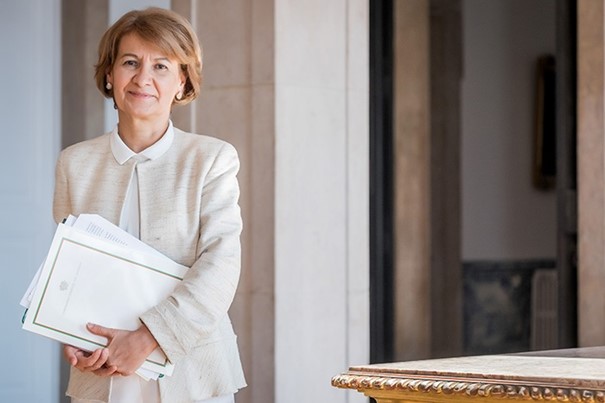【Vienna INPS Japan=Aurora Weiss】
Media literacy is a skill learned like reading or math. It is the ability to navigate within today’s complex and ever-changing media landscape and to know how to consume information, ask critical questions, avoid manipulation, and engage in digital spaces safely and confidently. As one of the life tools, educational initiatives on that topic were also launched in schools. (P-08)|JAPANESE|GERMAN|

To discuss this topic more than 200 people from across the “Organization for Security and Co-operation in Europe” region, meet end of the May 2024. at the Supplementary Human Dimension Meeting under the title “Media Literacy and Democracy”. The gathering was organized by the OSCE Chairpersonship of Malta, the OSCE Representative on Freedom of the Media (RFoM) and the OSCE Office for Democratic Institutions and Human Rights (ODIHR). Chair-in-Office Minister Dr. Ian Borg has consistently emphasized its significance, stating that “in an era characterized by rapid and often unchecked information flows, media literacy is not just beneficial but essential. This is especially true during this important election year, where an informed electorate, capable of critically assessing the information they encounter, strengthens the resilience of our democracies and enhances trust and confidence in our electoral processes.”
Technological advances have revolutionized access to a wide range of sources and sophisticated tools that enrich public discourse. However, social media and artificial intelligence do not only provide a vast array of opportunities but also numerous challenges, potentially threatening democratic public debate and undermining trust in democratic processes.
“Media literacy is not only about recognizing fake news; it’s about empowering citizens to navigate the digital landscape with discernment and critical thinking, ensuring informed democratic participation,” said the OSCE Representative on Freedom of the Media, Teresa Ribeiro.
The significance of media literacy for the democratic election process was in the focus of the conference. Strategies to enhance media literacy specifically in the context of elections will help to strengthen the foundations of democratic governance and ensure that citizens are empowered to make well-informed decisions at the ballot box.
“And nowhere is it more important to have all the facts than when we are standing in a polling booth to cast our vote,” stressed ODIHR Director Matteo Mecacci.
If you want to protect independence in media: Give journalists appropriate rights to protect themselves
In the pool of fake news, disinformation, and propaganda, the public is usually discussing the consummation of the desirable neutral, objective and critical journalism. Everybody wants to see the glorious “naked truth”! However, what it is and how to create an atmosphere and environment in which journalists can deliver authentic news to the public was explained to us by Dr. Klaus Unterberger, director of the Public Value department at the Austrian Broadcasting Corporation (ORF). The task of the Public Value Competence Center is to proactively promote the quality media debate and make a contribution to the legitimization of ORF in terms of fulfilling its public service mandate, as well as to media literacy and the role of the media for society and democracy.

One of Unterberger’s most significant statements was: “If you want to protect independence in media: Give journalists appropriate rights to protect themselves.”
According to him, there are key pillars that are necessary to maintain neutral and objective journalism inside the media-house.The first one is verifiability through external, public control, effective regulations and mandatory quality assurance. Of course, second is sustainable financing that enables independence from governments, political parties, but above all from the economic interests of the owners.
“Third are the rights and obligations which ensure that journalists are also able to protect their independence, including even from their bosses, if necessary. And last but not least: The courage, boldness and unconditional will for critical journalism beyond “courtyard reporting”, false balancing, and careerism,” told us Unterberger.
We can see that technology, in particular, has led to major problems of credibility in the media space. Unterberger claims that there is a cure in the fight against symptoms such as misinformation and recognizing fake news or propaganda. This can be achieved through close verification, double/triple checking, fact-checking, possibly also through appropriate AI technologies, but above all through the principles of critical journalism that doubts, verifies and questions.
Nowadays, there are many discussions about how to defend freedom of speech against political influences and their interference in private and public media houses. We asked Klaus Unterberger if he agrees that journalism today, especially with the advent of new technologies, is undervalued and underpaid, which are also signs that the quality has sunk.
“Absolutely! Across Europe, right-wing nationalist, populist governments and parties are jeopardizing the independence of the media, especially the public service media. The last example is Slovakia. At the same time, digital feudalism is emerging in which globally effective technologies are owned by a few corporations whose AI is completely unverifiable by the public. Both developments threaten not only quality journalism, but also the public communication space of democratic societies. As the digital market is dominated by a few oligarchic companies and there is still no business model for quality journalism, its existence is acutely endangered. The cost-cutting programs implemented in the public sector also pose a substantial threat to journalistic quality,” concluded Unterberger in our conversation.
Gender-specific attacks on female journalists is a growing trend
In the Report on the period from November 2023 until June 2024, The Representative on Freedom of the Media Teresa Ribeiro addressed the growing prevalence in various OSCE participating States of the false dichotomy of security versus media freedom. In a rapid rase is the political hostility towards independent journalism, the rise in violence and online attacks against journalists, and the use of technology to surveil journalists.
“Concerns like media sustainability and online violence against journalists are exacerbated by disinformation, technological advancements and profit-driven business models of Big Tech. Today’s technology concentrates power unprecedentedly, and large language models, like social media, facilitate the exploitation of democratic liberties and openness,” Representative Ribeiro highlighted disruptions in the digital information landscape.
After many journalists suffered pressure from their superiors during the carefully directed pro corona coverage during the pandemic, now some journalists lost their jobs for dared to investigate the war in Ukraine such as flows and money laundering or the behavior of soldiers as well as the weapons trafficking. Some of these European journalists not only lost their jobs but were exiled from their countries, which indicates orchestrated and well-organized attacks at all levels. We had the opportunity to hear their shocking experiences during a side event in OSCE that examined Freedom of the Media and democracy in the European Union. On the other side, Russia is isolated and rules a regime of full message control and disinformation.
Of particular concern is the alarming trend of online violence and disinformation disproportionately targeting women journalists, with severe repercussions for plurality and democracy. With nearly three quarters of women journalists experiencing online gender-based violence in the course of their work increased collaborative efforts are urgently needed to address the safety of women journalists, both online and offline. Studies from OSCE further substantiate a clear causal relationship between online threats and gender-related disinformation targeting women journalists and subsequent offline attacks.
A special phenomenon is the trend of a third party ordering attacks, criminal threats and intimidation on female journalists through embassy employees who are protected by diplomatic immunity, more precisely, diplomat with Red ID card which grants them full immunity, including against prosecution in criminal matters. The Austrian Ministry of Foreign Affairs, as well as the Austrian Ministry of the Interior, should carry out special supervision, i.e. check individuals to whom they issue the highest rank of diplomatic immunity to foreign agents who operate in their country, thus not only violating the constitution but also the Vienna Convention on Diplomatic Relations.
In addition to external factors, professional journalists are also threatened by individuals who have infiltrated the media space and have completely different goals than providing information of public interest. I personally went through attacks orchestrated by individuals who abused their position as producers of the Voice of America (VOA) with the aim of misinforming and discrediting professional journalists, about which the editorial staff was informed. Also worth mentioning are the attacks by political activists Jamin Mujanovic, who presents himself as a Bosniak political expert of Balkan with the aim of sabotaging and discrediting the journalist through social media.
Gender-based violence online and offline and gender-related disinformation endangers the well-being of journalists and their ability to perform their professional duties. These acts have a chilling effect, causing women journalists to self-censor or even leave their careers entirely at a cost not only to those targeted but also to media freedom and plurality as a whole, is agreed by the Joint Statement on the Safety of Women Journalists on the 30th Meeting of the OSCE Ministerial Council Skopje in December 2023.
The pervasive practice of silencing critical voices continues with an increasing number of news outlets being declared ‘undesirable’ and outlawed, and journalists being designated as ‘foreign agents.’ The ongoing attacks and imprisonments of independent journalists for simply doing their work, blockages of international information sources, and continuing harassment of journalists living in exile illustrate the grim picture of an information landscape where any courageous effort to disseminate independent news and information carries a profound personal risk.
It is good that we have recently started to talk about media literacy, but we should never stop talking about the safety of journalists. That is why we are putting to light a record number of media workers who were killed while performing their jobs.

Attacks on journalists’ lives and liberty remained at near-record levels in 2023, with the Committee to Protect Journalists documenting 99 journalists killed worldwide, the highest total since 2015. CPJ also documented 320 journalists imprisoned for their work as of the December 1 date of its annual prison census — near the global all-time high of more than 360 a year earlier.
The Israel-Gaza war has taken an unprecedented toll on Gazan journalists since Israel declared war on Hamas following its attack against Israel on October 7, 2023. As of July 1, 2024, preliminary investigations from the Committee to Protect Journalists (CPJ) showed at least 108 journalists and media workers were among the more than 38,000 killed since the war began. 32 journalists were reported injured, 2 journalists were reported missing and 51 were reported arrested.
Eighteen journalists and media workers were killed in the Russo-Ukrainian War, seven in the war in Donbas in 2014–2015, and ten in the full-scale Russian invasion of Ukraine in 2022.
Ribeiro in the report on the 13 June 2024 underlined the need to break the vicious circle of impunity and reignite efforts to ensure full accountability for the assassination of journalist Giorgos Karaivaz, in Greece, Ján Kuciak, in Slovakia, and Duško Jovanović, who was murdered 20 years ago in Montenegro.
“I also expressed my deep concern regarding the setback caused by the unfortunate acquittal in the murder case of journalist Slavko Ćuruvija, in Serbia. The true test of a rule of law-based society is how it delivers justice, especially to those who put themselves at risk to uphold the values of a free press. I will also keep an eye on the judicial processes of the assassination of journalists Daphne Caruana Galizia in Malta, and of Peter R. de Vries in the Netherlands. I am relieved to hear that yesterday a Dutch court convicted several suspects for the killing of investigative reporter de Vries,” stressed Ribeiro in her report in June 2024.
INPS Japan
This article is brought to you by INPS Japan in partnership with Soka Gakkai International, in consultative status with UN ECOSOC.




